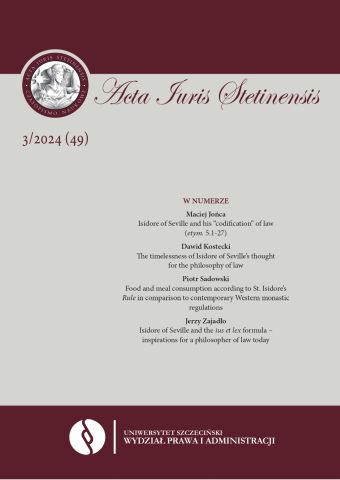The timelessness of Isidore of Seville’s thought for the philosophy of law
The timelessness of Isidore of Seville’s thought for the philosophy of law
Author(s): Dawid KosteckiSubject(s): Law, Constitution, Jurisprudence, Philosophy of Law, Roman law
Published by: Wydawnictwo Naukowe Uniwersytetu Szczecińskiego
Keywords: Isidore of Seville; Etymologiae; philosophy of law; natural law; reception
Summary/Abstract: The intellectual legacy of Isidore of Seville is impressive. The Sevillian left behind hundreds of pages of texts that are a subject of reflection of theologians, historians, philosophers and literary scholars. The author of Etymologiae, as a talented compiler, created a cohesive vision of law, that resonates indirectly in contemporary philosophy of law. The aim of this paper is to show one possible path of implementation of a fragment of the intellectual legacy of the bishop of Seville to explore and expand readers’ horizons in legal philosophy. Isidore of Seville did not create his own school of natural law, but his works affected Thomas Aquinas, to name one. The bishop of Seville can hardly be called solely a thoughtless copyist, because the model of law that he proposed is largely a universal and timeless canon explored by today’s outstanding philosophers and theoreticians of law, such as L.L. Fuller or R. Dworkin. Despite the passage of fifteen centuries since the birth of the bishop of Seville, it turns out that the answer to the question of what should a good law be like is still a subject of discourse among lawyers, philosophers, ethicists, sociologists or anthropologists of culture. In order to present the intellectual legacy of the Sevillian, this article uses the method of historical investigation, comparison and linguistic analysis.
Journal: Acta Iuris Stetinensis
- Issue Year: 2024
- Issue No: 49 (3)
- Page Range: 37-56
- Page Count: 20
- Language: English

